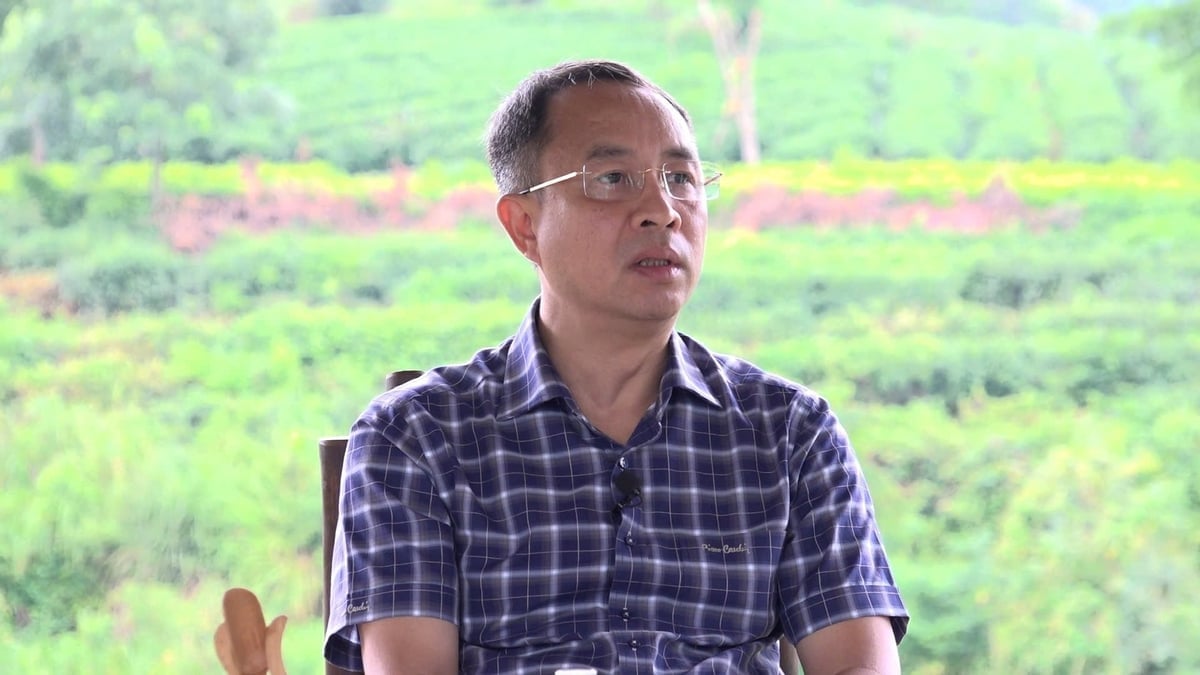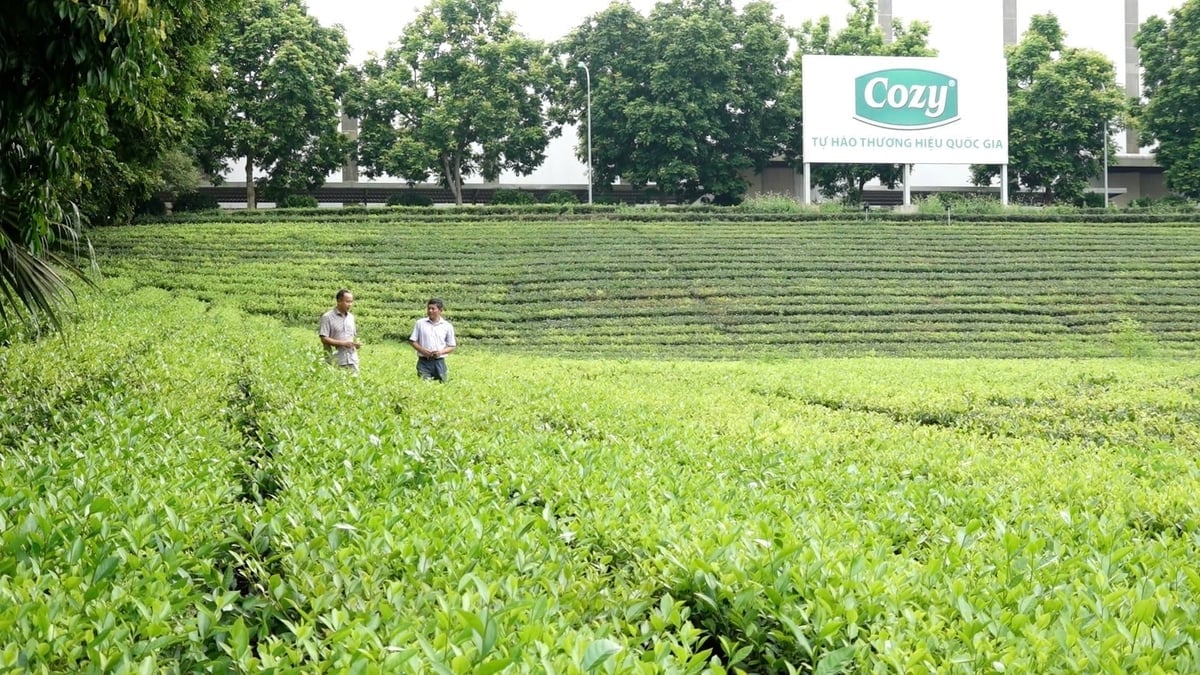November 12, 2025 | 02:47 GMT +7
November 12, 2025 | 02:47 GMT +7
Hotline: 0913.378.918
November 12, 2025 | 02:47 GMT +7
Hotline: 0913.378.918
Mr. Doan Anh Tuan, Director of The New Generation Co., Ltd. and founder of the Cozy tea brand, is one of the first pioneers of organic tea production in Vietnam.
As a pioneering entrepreneur in shifting toward organic agriculture in the tea industry, Mr. Doan Anh Tuan - Director of The New Generation Co., Ltd. and CEO of the Cozy tea brand - shared: "For the tea industry to grow and enhance its competitive advantage, it must certainly develop a market for organic tea products."

Mr. Doan Anh Tuan - CEO of Cozy tea. Photo: Quang Dung.
According to Mr. Tuan, Vietnam is one of the five original homelands of the tea plant in the world, along with China, Laos, Thailand, Myanmar, and India. Tea not only provides livelihoods for local people but also represents a unique cultural identity for millions of Vietnamese. However, the greatest bottlenecks and barriers for Vietnam’s tea industry remain fragmented thinking, limited raw material areas, low product quality, insufficient investment, and a lack of competitiveness.
For decades, Vietnam’s tea sector pursued yield and output goals, relying heavily on chemical fertilizers and pesticides. This led to soil degradation, environmental damage, and tea quality consistently at a warning level.
Recognizing these emerging problems in the tea sector, even though Cozy had already become a National Brand more than 20 years ago, the company has continuously sought products that meet the rising demand of consumers. Organic products, therefore, became a strategic priority.
"We realized that consumers in Vietnam and around the world are increasingly turning to safe agricultural products. The tea sector cannot stand outside this trend because it is not only a matter of health, but also of the environment, sustainable farming, and ensuring a livable environment for today and the future.
As a leading tea producer in Vietnam, with an established reputation in the global tea industry, Cozy is determined to pioneer the shift toward organic agriculture," Mr. Doan Anh Tuan stated.
Cozy embarked on organic farming in 2015, when the concept was still unfamiliar to many in Vietnam. It started with 15 hectares of organic tea at Phu Ho (Phu Tho province). By 2018, this area had been certified organic, and the company gradually expanded cultivation to other regions.
The journey was extremely challenging. Mr. Tuan shared: "The hardest part was finding land that met organic tea standards and creating buffer zones to prevent cross-contamination.
In Phu Ho, the land had previously been used for forestry with little use of fertilizers or pesticides, yet Cozy still had to remove the topsoil and completely rebuild a new fertile layer. It took 2-3 years of applying green manure and bio-organic fertilizers to create soil that was both organic and sufficiently nutrient-rich. Every year we also added tea waste and by-products to increase humus and maintain a habitat for beneficial microorganisms.
In the early years, when the ecosystem was not yet balanced, pests spread aggressively, almost forcing us to give up. But with determination, our staff manually collected pests to avoid using chemicals. Fortunately, after several years, the ecosystem stabilized, birds and frogs returned, and pests disappeared".
Overcoming difficulties in raw materials, processing technology, and market competition, Cozy has now become the largest tea brand in Vietnam, managing more than 4,500 hectares of integrated raw material areas nationwide. Cozy’s teas are exported to over 60 countries and have gained access to even the most demanding markets.
“When we introduced organic tea to international customers, we clearly felt their admiration and respect. Thanks to this, the position of Cozy in particular and Vietnamese tea in general has been increasingly elevated,” the Cozy CEO said proudly.

According to Mr. Doan Anh Tuan, organic agriculture is an inevitable trend, especially for the tea industry. Photo: Quang Dung.
“As living standards improve, the demand for organic products will continue to rise, which means the market will become more favorable. What matters is that we must keep promoting communication to expand consumer demand, while also building trust that the products are truly organic. At the same time, organic products should not be priced far higher than conventional ones,” Mr. Doan Anh Tuan emphasized.
The agriculture and environment sector has set a target that by 2030, Vietnam’s tea cultivation area will remain stable at around 120,000–125,000 hectares, with about 98,000–100,000 hectares in the northern midlands and mountainous region, 10,000–12,000 hectares in the North Central region, and 8,000–10,000 hectares in the Central Highlands.
Alongside applying scientific and technical advances such as shade-tree planting, water-saving irrigation, mechanized pruning and tea bud harvesting, and proper pesticide use, the goal is that by 2030, over 70% of tea areas will adopt GAP or equivalent production standards, with more than 70% granted planting area codes.
Analyzing these targets, Mr. Doan Anh Tuan proposed: there must be a national program for the tea sector, especially with clear policies to promote organic tea development, as this is the solution to increase value and competitiveness for Vietnamese tea in the future. "One day, the world will speak of Vietnamese tea just as it does of Brazil’s coffee or Norway’s salmon - as a globally renowned brand," he affirmed.
Translated by Kieu Chi

(VAN) From straw, coffee husks, to sugarcane bagasse, agricultural by-products are being transformed into new resources for a lower-emission future in crop production.

(VAN) The application of remote sensing technology and AI is becoming a strategic tool helping Viet Nam modernize agriculture management and implement smart environmental governance.

(VAN) From the early days, international cooperation has helped Vietnam’s agriculture sector broaden its vision, access knowledge, and achieve significant progress in development and poverty reduction.

(VAN) Over the past 80 years of formation and development, Quang Ninh has affirmed its pioneering position in resource management and environmental protection.

(VAN) Amid many hardships in distant Cuba, Vietnamese experts quietly sow seeds of knowledge every day, reviving once-barren rice fields.

(VAN) Numerous practical ideas, solutions, and proposals were presented at the national forum themed: ‘Rural Tourism Connected with Ecological Civilization and the Creation of a Green Living Environment.’

(VAN) TH Group is implementing multiple solutions to reduce white pollution, notably through the 'Collect Cartons - Spread Green Living' campaign and plastic reduction initiatives.